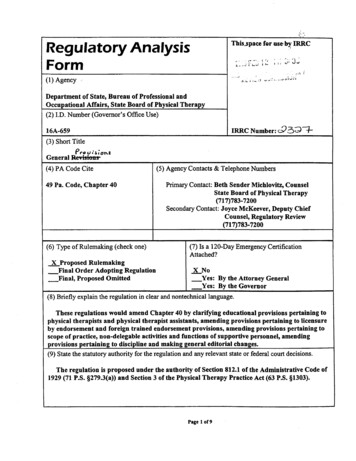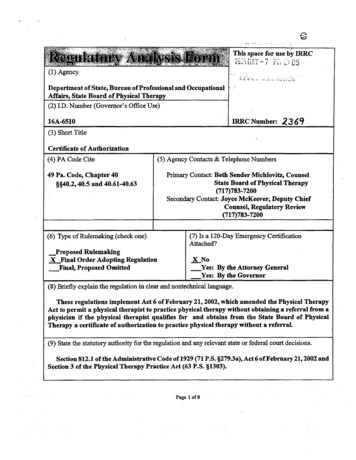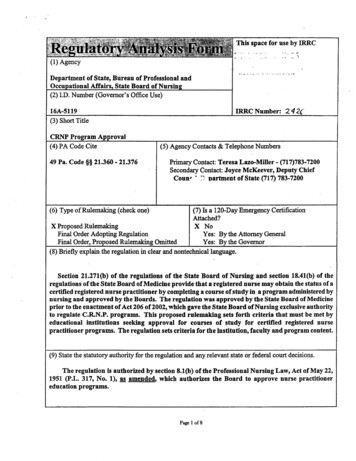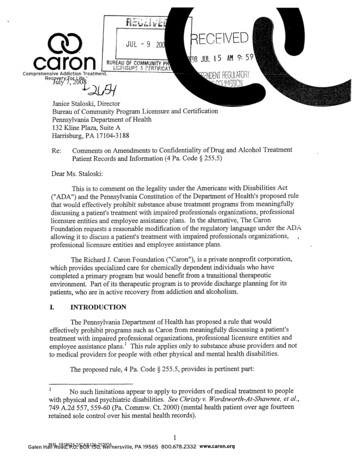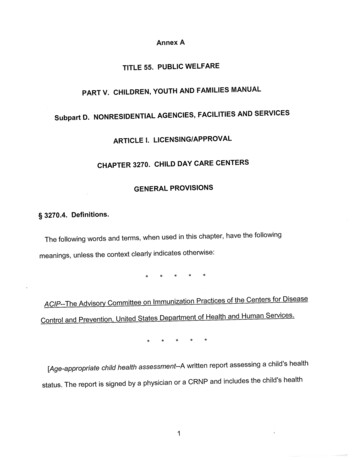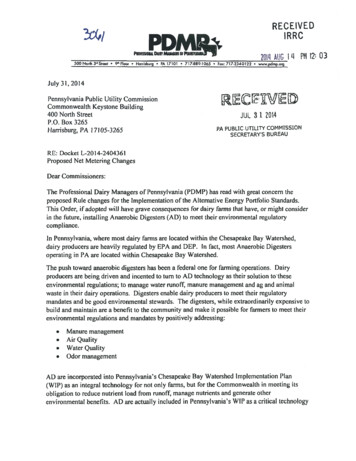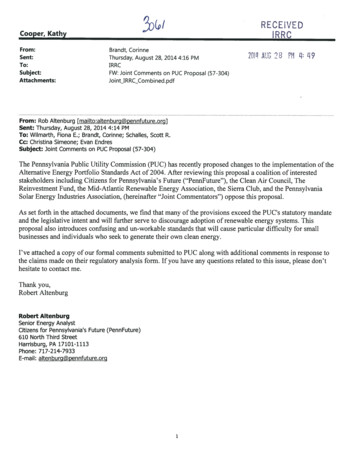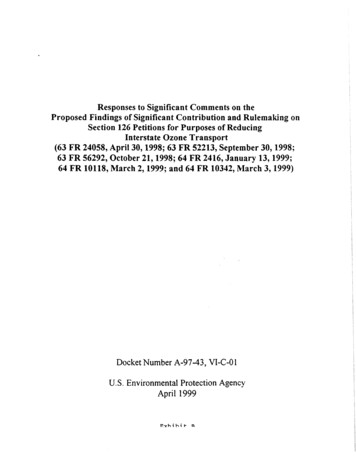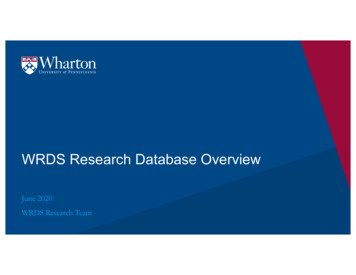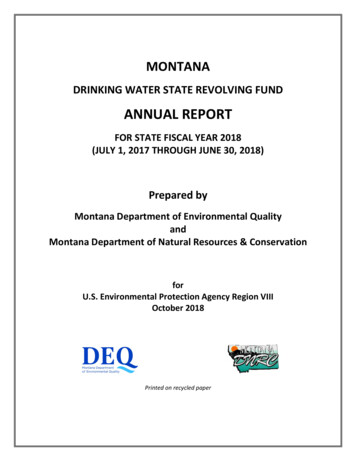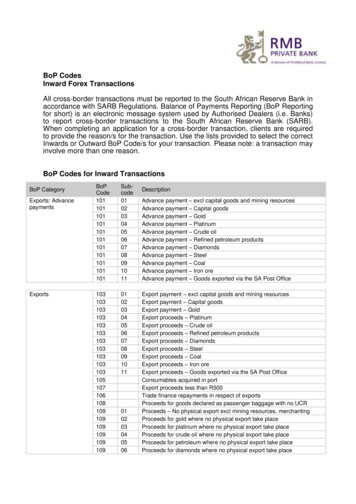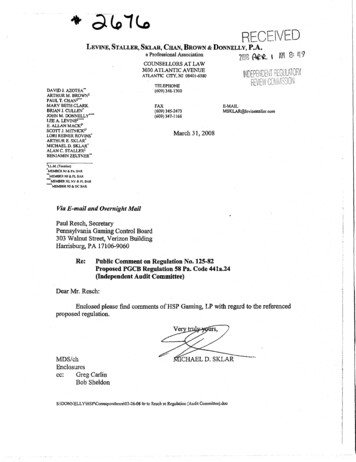
Transcription
"51P1URECEIVEDLEVINE, STALLER, SKLAR, CHAN, BROWN & DONNELLY, P.A.&49a Professional AssociationCOUNSELLORS AT LAW3030 ATLANTIC AVENUEATLANTIC CITY.NJ 08401-6380TELEPHONE(609)348-1300DAVID J.AZOTEA"ARTHUR M. BROWN'PAUL T.CHAN*"'MARY BETH CLARKBRIAN J. CU1XEN'JOHN M. DONNELLY*'"LEEA.LEVINE*"'*E. ALLAN MACK.''SCOTT J.MITNICK"LORI REINER ROVINS"ARTHUR E. SKLAR'MICHAEL D. SKLAR*ALAN C. STALLER'BENJAMIN ZELTNER"(609) mMarch 31, 2008\L.M. Toxalion)'MEMBER NJ &. PA BAR MEMBER NJ&FL BAR"'MEMBER NJ. NV & FL BAR""MEMBER NJ & DC BARVia E-mail and Overnight MailPaul Resch, SecretaryPennsylvania Gaming Control Board303 Walnut Street, Verizon BuildingHarrisburg, PA 17106-9060Re:Public Comment on Regulation No. 125-82Proposed PGCB Regulation 58 Pa. Code 441a.24(Independent Audit Committee)Dear Mr. Resch:Enclosed please find comments of HSP Gaming, LP with regard to the referencedproposed regulation.MDS/chEnclosurescc:Greg CarlinBob SheldonCHAEL D. SKLARS:\DONNELLY\HSP\Corrcspondence\03-26-08 Itrto Resch r« Regulation (Audit Committee).doc
DRAFT REGULATIONS COMMENT FORMPlease complete all of the fields below before printing:03/31/2008S E C T I O N * ORSUBJECTSection 441a.24FIRST NAMEMichaelLASTNAMEADDRESS 1 i 3030 Atlantic AvenueADDRESS 2CITY(Atlantic CitySTATE [ N JORGANIZATIONJHSP Gaming, L P .EMAIL ADDRESSmsklar@levinestaller.comZIP CODECOUNTYTELEPHONE[(609)348-1300COMMENTSPlease see attached comments on behalf of HSP Gaming, L.P.Comments may be submitted to the Board by U.S. Mail at the following address:Pennsylvania Gaming Control BoardP.O. Box 69060Harrisburg, PA 17106-9060Attn: Public CommentJ
BEFORE THEPENNSYLVANIA GAMING CONTROL BOARDIn re: Regulation No. 125-82 :Proposed 58 Pa. Code 441 a.24 :HSP Gaming, L.P.Docket #1356COMMENTS OF HSP GAMING, LP TOPROPOSED PENNSYLVANIA GAMING CONTROL BOARDREGULATION #125-82 (Proposed 58 Pa. Code 441 a.24)Pursuant to the Independent Regulatory Review Process, HSP Gaming,L.P. ("HSP") respectfully submits the following comments to the PennsylvaniaGaming Control Board's ("Gaming Board") proposed Regulation No. 125-82published in the Pennsylvania Bulletin at 38 Pa. B. 1039 on March 1, 2008.The Gaming Board proposed the enactment of the referenced regulationwith the stated objective of requiring non-publicly traded slot machine licenseesto establish an independent audit committee. In the "Explanation ofAmendments," the Gaming Board stated that the intent of the Proposedindependent Audit Committee Regulation ("Proposed Regulation") was to requirenon-publicly traded companies to meet the requirements placed on publiclytraded companies by the Sarbanes-Oxley Act of 2002 ("SOX"). Accordingly, theBoard noted that the Proposed Regulation will only impact three existing slotmachine licensees as the other licensees are publicly traded and thus, aresubject to the audit committee requirements under SOX. Thus, the criteriarequired under the Proposed Regulation are intended to parallel the existing
requirements for publicly traded licensees.Publicly traded casino licenseeswould not be subject to the requirements under the Proposed Regulation.In fact, the Proposed Regulation goes far beyond requirements applicableto publicly traded corporations and accordingly, places an unfair andunwarranted burden on non-publicly traded casino licensees.As a starting point, the purpose of an audit committee under SOX, and byextension, the Proposed Regulation, should be examined. SOX requires that anaudit committee or equivalent body must be established by and among the Boardof Directors of a company "for the purpose of overseeing the accounting andfinancial reporting processes of the [company] and audit of the financialstatements of the [company]." 15 U.S.C. §7201(3). Thus, an audit committee'sfunction under SOX is one of oversight.The Proposed Regulation contains requirements well outside its statedpurpose and the purpose of SOX. Rather than creating a parallel system, theProposed Regulation unfairly imposes substantially more onerous and, thusmore costly, requirements on non-publicly traded casino licensees.For example, under the Proposed Regulation, the independent auditcommittee is not only charged with the oversight function but also is givenextensive obligations to review numerous reports and file various reportstogether with certifications regarding a wide range of issues not required underSOX. The Proposed Regulation provides that "the independent audit committeeis established with the general purpose and duty to monitor and report to theBoard on the operations and financial control of the slot machine licensee." See
58 Pa. Code §441a.24(1) (emphasis added). No such obligation Is imposed onpublicly traded companies covered by SOX.Additionally, the ProposedRegulation has severely more restrictive requirements as to the composition ofthe audit committee.The examples set forth above are just two of the many distinctionsbetween the treatment of SOX-governed companies and those to be governedby the Proposed Regulation. The chart below contrasts the requirements underthe Proposed Regulation and that which is required of audit committees underSOX.Sarbanes - OxleyProposed RegulationGeneral PurposeOversee the accounting andfinancial reporting processesaudits of financial statementsof company-§7201 (3)Monitor and report to PGCB onoperations and financial controls oflicensee -§465a.24(1)CharterNo comparable requirementCriteriaNumber ofMembersNo minimum or maximumnumber; one member mustbe audit committee financialexpert - §7265Charter must outline purpose,objectives and organization §465a.24{2)Must be 3 - 5 members, one of whomis an audit committee financial expert §§465a.24(4},(19)
Sarbanes - OxleyProposed RegulationCriteriaIndependenceMembers may not:(a) accept any consulting,advisory or othercompensatory(b) be an affiliated person-§78j-1(m)(3)Members must:(a) be independent in character andjudgment;(b) have no ownership interest inlicensee;(c) have no material relationshipwith licensee; materiality exists if:(i) receives compensation(ii) employee of licensee withinlast 3 years(iii) executive officer of businessengaged by licensee with last(iv) employee of company thatdid over 1M in business withlicensee within last 3 years- §§465a.24(5)-(7)RetentionNo comparable requirementFixed term contracts and terminationonly for good cause - §465a.24(8)FundingFunded by company §78j-1(mX6)Funded by company - §465a.24(10)CPA firmretentionAudit Committee directlyresponsible for appointment,compensation and oversightof CPA firm - §78(j)- 1(m)(2)Audit Committee directly responsiblefor appointment, compensation andoversight of CPA firm.CPA firm:(a) prohibited from providingnon-audit services(b) barred if companyexecutiveworked for CPA within oneCPA firm must be: Independent Nationally recognized Gaming experience-§465a.24(11)-§§78j-1(g),(l)Review of reportsNo comparable requirement{review and certification ofannual audit required of CEOand CFO not audit committee §724a(1)Each member must:(a) review all financial and statisticalreports under §465a.4;(b) certify as to accuracy of annual-§465a.24(12)
Sarbanes - OxleyProposed RegulationCriteriaDepartment HeadHiringNo comparable requirement.Hire supervisors of internal audit andsurveillance who report directly toAudit Committee for policy issues §§465a.24(13), (14)Internal ControlsNo comparable requirementApprove internal controls and monitorcompliance - §465a.24(15)(Management and CPA firmrequired to evaluate andassess internal controls nojaudit committee - §7262)AnonymousComplaintsAnnual ReportAnnualCertificationEstablish procedures forreceiving complaints regardingaccounting and internalcontrols, includingconfidentiality,anonymous submissions §78j-1(m)(4)No comparable requirement.Establish procedure for directhandling of complaints regardingcompliance and internal controls,including, anonymous complaints §4653.24(17)No comparable requirement.Each member must certify:(a) meets independence standards(b) in compliance with code ofconduct-§465a.24(19)Must file report evaluatingcommittee's adherence to its charter §465a.24(18)Some of the more significant differences set out in the Chart are as follows:1.Under the Proposed Regulation, members of the audit committeemay not include directors or owners of the company. Under SOX, the membersof the independent audit committee must be members of the Board of Directorsof the company and may include owners as long as such owner is not the
beneficial owner of more than 10% of any class of voting equity securities.Thus, while the SOX requirements recognize the value of having audit committeemembers familiar with the entire scope of the company's business, the ProposedRegulation requires that the job be done by those without benefit of suchknowledge.2.Under the Proposed Regulation, the independent audit committeemust have between three and five members. Under SOX, the independent auditcommittee may consist of any number of members, from one to as many personsthat sit on the company's Board of Directors. There is no magic to the arbitrarynumbers of three to five. Each casino licensee should be permitted to determinethe ideal number, subject to Gaming Board regulatory oversight, to allow auditcommittee size to reflect the needs of the licensee.3.Under the Proposed Regulation, the independent audit committee"is directly responsible for the appointment or approval of the appointment,compensation, retention and oversight of the department heads of thedepartments of internal audit and surveillance". These department heads arerequired to report directly to the independent audit committee for matters ofpolicy, purpose, responsibility and authority."Under SOX, there is nocomparable requirement.4.Under the Proposed Regulation, each member of the independentaudit committee must individually review all of the standard financial andstatistical reports of the licensee and individually prepare a statement toaccompany the annual audit certifying that the independent audit committee
"member has reviewed the audit and, based on the member's knowledge, theaudited financial statements do not contain any untrue statement of a materialfact or omission of a material fact necessary to make the statements made, in thelight of the circumstances under which the statements were made, notmisleading and the financial statements in the audit fairly present in all materialrespects the financial condition, results of operations and cash flows of the slotmachine licensee as of, and for, the periods presented." Under SOX, there is nocomparable requirement.As is evident from the foregoing, the Proposed Regulation treats nonpublic companies completely different from publicly-treated companies. There isno rational basis for this distinction. Indeed, the disparate treatment betweenpublicly traded and non-publicly traded companies raises due process and equalprotection issues under the United States Constitution and the Constitution of theCommonwealth of Pennsylvania.In addition to the comments on the disparate treatment under theProposed Regulation, HSP further submits that a SOX-style audit committee isnot necessary for casino licensees in the Commonwealth of Pennsylvania.Numerous layers of protection exist to insure company accountability and checksand balances are in place to prevent accounting irregularities.SOX wasadopted, in large part, because most publicly traded companies are nowherenear as highly regulated as Pennsylvania slot machine licensees.Casinolicensees in Pennsylvania operate in a cashless environment in which the slotmachines are based on a ticket in/ticket out system.Moreover, each slot
machine is directly linked to the state-controlled central computer system. See 4Pa. C.S. §1323. Each casino licensee is required to have an internal auditdepartment charged with auditing the licensee's operations. Each licensee isrequired to develop thorough internal controls, which must be approved by theGaming Board and must be tested annually by the external auditor.Eachlicensee is required to file extensive monthly financial reports with the GamingBoard. Each licensee is required to submit to an annual audit of its financialstatements by an external certified public accounting firm. Finally, the GamingBoard's financial task force regularly reviews and examines the financialoperations of each casino licensee. Nonetheless, HSP recognizes that certainaspects of the SOX audit committee requirements may be appropriate.We respectfully submit that the Proposed Regulation must, at a minimum,insure equality of treatment between publicly traded and non-publicly tradedcasino licensees. Thus, the Proposed Regulation should be revised to requireeach licensee to establish a committee comprised of individual(s) who cannot besenior management executives or employees of the casino licensee or acceptany consulting, advisory or other compensatory fee. The committee should begranted the following authority:1.Complete access to the licensee's independent certified publicaccounting firm and directors of internal audit and surveillance;2.The authority and funding to engage independent counsel andother advisors as it deems necessary to carry out its duties; and
3.The authority to establish procedures for the receipt, retention andtreatment of complaints regarding accounting, internal accounting controls orauditing matters and establish a system for receiving confidential, anonymoussubmissions by employees regarding accounting or auditing matters.For the foregoing reasons, HSP submits the Proposed Regulation shouldbe revised as set forth above.MICHAEL D. SKLARJOHN M. DONNELLYLevine, Staller, Sklar, Chan,Brown & Donnelly, PA.3030 Atlantic AvenueAtlantic City, NJ 08401Attorneys for HSP Gaming, L.P.S:\DONNELLY\HSP\03-31-08 Comments to Regulation (Audit Committee).doc
function under SOX is one of oversight. The Proposed Regulation contains requirements well outside its stated purpose and the purpose of SOX. Rather than creating a parallel system, the Proposed Regulation unfairly imposes substantially more onerous and, thus more costly, requirements on non-publicly traded casino licensees.
